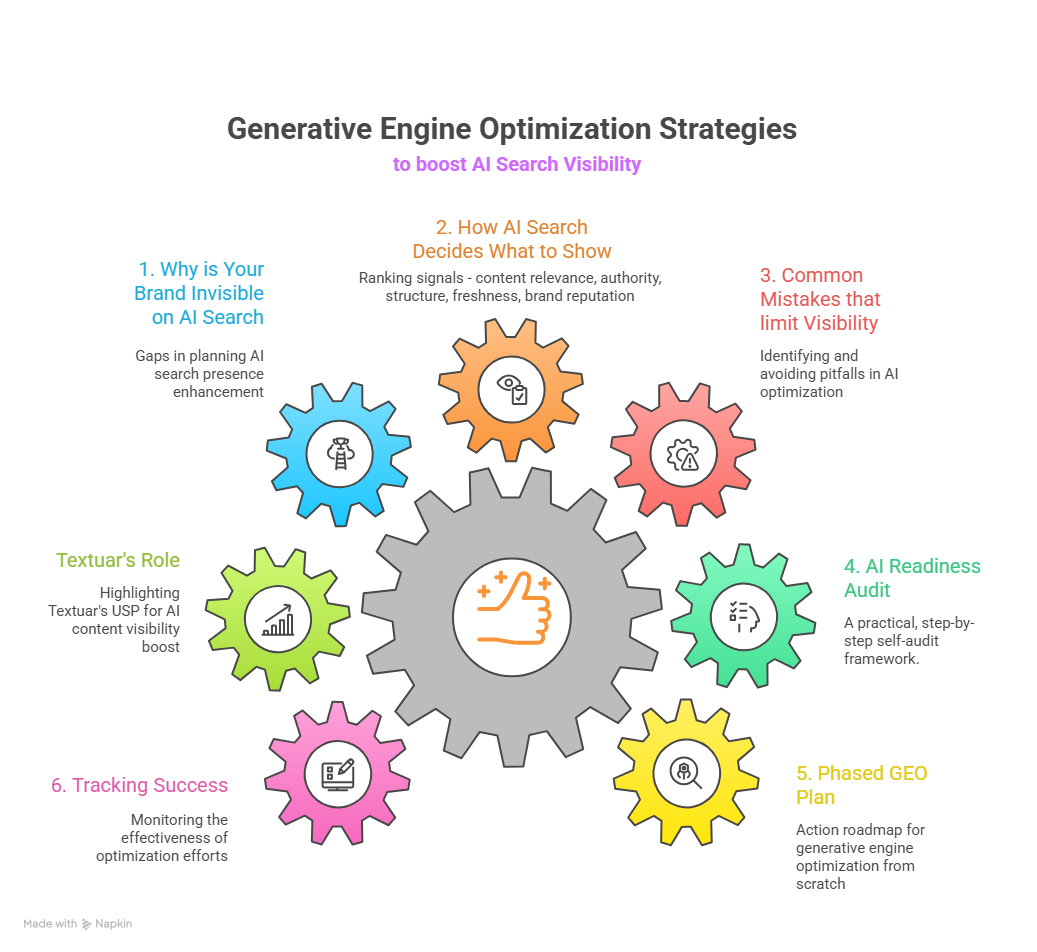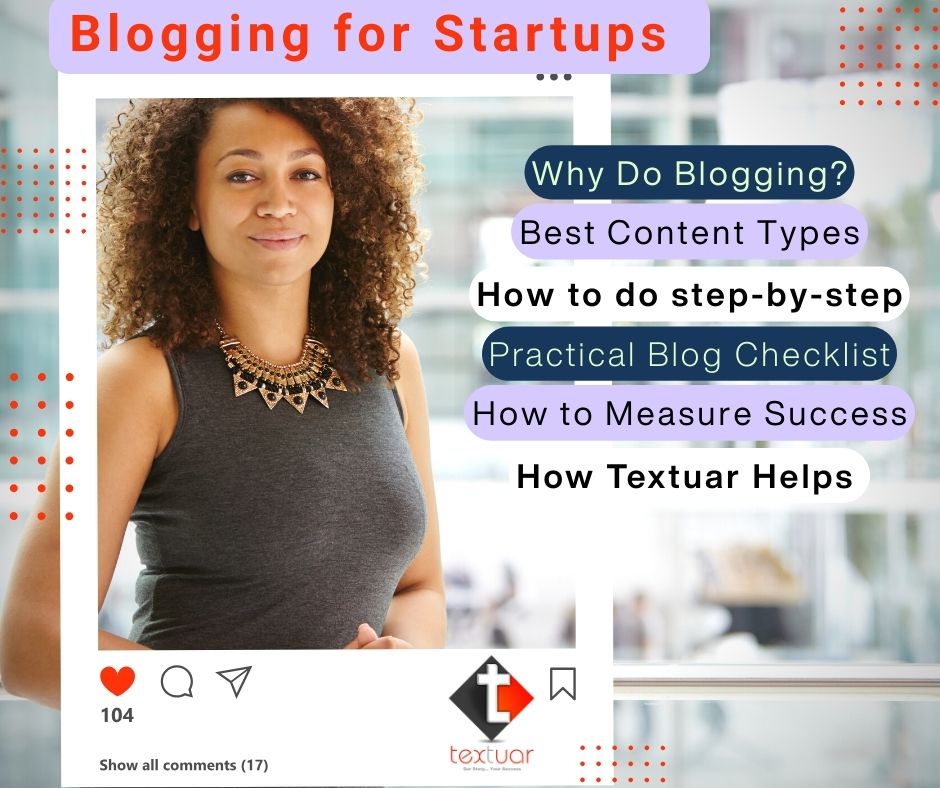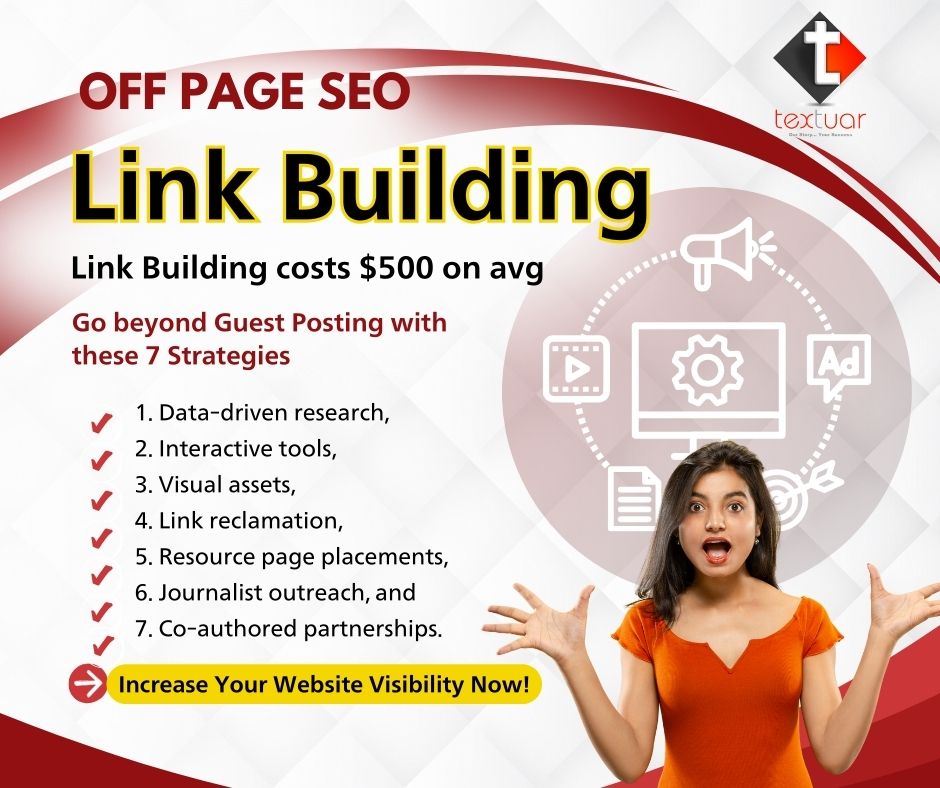📌 TL;DR Summary- What is Covered?
To win in 2026, AI and LLM companies must treat content as education + trust-building for very smart, very skeptical buyers.
How to do it:
- Map content to the buyer journey (awareness, evaluation, commitment) with explainers, case studies, ROI tools, and implementation guides.
- Create role-specific content for CTOs, data scientists, developers, training leaders, and non-technical buyers.
- Use a mixed format stack: long-form blogs, webinars, short videos, newsletters, infographics, and technical docs.
- Layer in strong SEO (intent-based keywords, topic clusters, schema, AI Overview readiness) and measure ROI via MQLs, SQLs, demos, and content-influenced revenue.
- Build thought leadership, not just product pages: research, benchmarks, ethics, governance, and future-of-AI POVs.
AI training and LLM businesses work in a rapidly exploding field. These companies assist other businesses in training their teams or developing systems with large language models (LLMs). They develop tools, provide services, or establish training programs for AI products and teams. Their clients are tech teams, leaders, and researchers who all seek smart and trusted solutions.
But this space is not easy to dominate.
The technology is sophisticated, and the tools are very complex. And most decision-makers are not AI professionals. They require assistance to understand the value. Trust is also a big component of the buying decision.
On top of this, these solutions tend to be high-priced services or products. Purchasers must feel confident before they respond positively.
That is exactly why content marketing for AI companies is crucial.
It enables you to clarify your services, demonstrate your expertise, and establish strong trust. AI blog writers develop deeply targeted content to lead buyers step by step from learning to buying.
You may be a C-level founder, marketer, or product manager at an AI company. If so, then this guide is intended exclusively for you.
You will get a highly elaborate guide on how to create simple, clear, and useful content that generates actual business outcomes.
Let’s get started.
What is Content Marketing for AI Companies?
Target customers of your AI company may vet you out of the many options for specific AI tools and solutions. With content marketing for AI and LLM companies, your brand can stand out in this crowded space.
An expert like Textuar will help in the strategic creation and distribution of valuable and relevant content. The idea is to attract, engage, and convert decision-makers at companies that need your service offerings.
Today, more and more companies need an AI differentiator and your company is positioned to get a leading edge with targeted content marketing for AI companies.
With Textuar’s competency in content creation for AI firms, you can cut through technical noise to clearly articulate your value proposition:
-Your unique expertise in AI development
-Case studies on successful projects
-Informative material to strengthen your industry authority perception
Establishing authority and differentiating your offering in a crowded market are just two of the many advantages you get when you hire Textuar for content marketing for AI solutions.
Who Benefits in the AI/LLM Industry with Strategic Content Marketing?
Even before you create any content, you need to know whom you are addressing. AI and LLM purchasers are smart. However, each of them is interested in various things. Following are some typical groups of people within your audience:
| Target Audience & Content Needs for AI/LLM Companies | |||
| Audience | Key Concerns | Content Types They Need | Content Goals |
| Business Leaders (CTOs, CIOs, Data Officers) | ROI, integration risks, lack of technical depth | Case studies, ROI calculators, high-level explainers | Build trust, simplify complexity, prove business impact |
| Researchers & Data Scientists | Hard data, benchmarks, skepticism of marketing claims | Technical whitepapers, research collaborations, model performance reports | Validate claims with data, establish technical credibility |
| Developers & Engineers | Code quality, system compatibility, implementation ease | Tutorials, API docs, code samples, troubleshooting guides | Reduce adoption friction, showcase technical reliability |
| Training Leaders | Upskilling teams, measurable outcomes | How-to guides, training frameworks, success metrics | Demonstrate scalable learning solutions |
| End Customers (AI/LLM buyers) | Fear of obsolescence, high-stakes decisions | Comparison guides, risk-mitigation content, ethical AI frameworks | Educate, reassure, and guide decision-making |
Let us cover these groups in more detail:
1. Business Leaders (CTOs, CIOs, and Data Officers)
These are individuals who want to stay ahead but avoid big mistakes. They are also the ones that get pitched AI solutions every day. However, most lack the technical knowledge to judge what’s good.
Hence, they worry about return on investment and fear integration problems.
That is why you need content marketing for AI training to create technical documentation and clear case studies for proof that your AI solution works.
2. Researchers and Data Scientists
This group mainly includes technical experts in AI and LLM models training. This means that they want to see hard data and real benchmarks. So, it’s expected for them to doubt marketing claims.
They test everything and generally influence buying decisions but rarely make the final call.
You can offer them research papers, technical details, and a chance to talk with your engineers for expert insights.
3. Developers and Engineers
These guys are responsible for building and maintaining systems. They care about code quality and documentation. Plus, they want proof your solution won’t break their existing setup.
So, be prepared with accurate examples, tutorials, and educative articles on the AI domain on themes like RAG, tokenisation, and prompt engineering.
4. Training Leaders
They focus on closing skill gaps within the AI development industry. So, they need learning plans, success metrics, and stories from similar companies. The how-to guides and listicles will definitely help them. These assets will power up content marketing for AI companies.
5. Target Customers for AI and LLM Solutions
The AI world changes fast, and buyers struggle to keep up and make smart choices. This leads to high-stakes decisions with big budgets. Which, rightfully so, makes them careful and slow to buy.
Plus, many fear their teams won’t be able to use AI tools effectively. This creates another barrier to adoption. However, you mitigate these problems and assure your customers through proper content marketing for LLM training.
Their Pain Points and Motivations
- Complexity: AI is hard to understand. Many buyers feel unsure or overwhelmed.
- Trust: LLMs are new. Buyers need to feel confident in your methods.
- Risk: They don’t want to waste money or time on bad solutions.
- Time: Learning and applying AI takes time. Your content should save them time.
- Results: They want proof—metrics, examples, and clear benefits.
The Buyer Journey
Understanding the buyer journey helps you know what to offer at each step.
- Awareness – They just discovered they have a need.
- Evaluation – They are comparing options and researching.
- Commitment – They are ready to buy and just need the final push.
You need different content for each stage. That’s what we’ll cover next.
How to Develop a Content Strategy Aligned with the AI/LLM Buyer Journey?
Your content strategy must match how AI buyers actually make decisions. This is core to successful content marketing for LLM companies. The stakeholders need lots of education, they hate risk, and they have technical knowledge. Therefore, your content marketing for AI companies should leverage content that works smarter, not just harder.
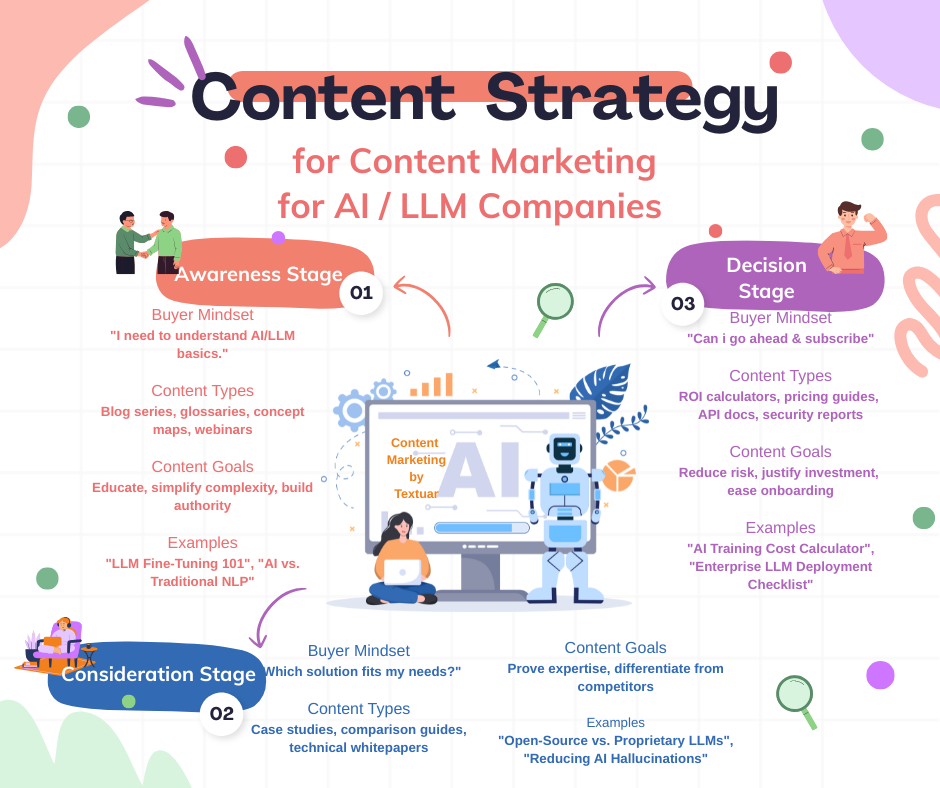
1. Awareness Stage Content: Teaching the Basics
When prospects first consider AI, they’re exploring what’s possible. So, they need proper education that makes complex topics simple.
This requires the proper implementation of effective content marketing for AI training. This entails
- Creating a blog series that explains how AI works in real business settings.
- Making how-to guides about building versus buying AI solutions.
- Creating interactive tools like AI term glossaries and concept maps.
- Hosting webinars with known AI experts.
You can also use AI to spot trending topics in technical communities. This helps you create content people actually want to read. Make sure to use AI industry content writers for better impact in this stage.
2. Consideration Stage Content: Proving Your Worth
In this stage, prospects are comparing options. They need concrete proof that you can solve their problems. Targeted content marketing for AI companies an help.
Hence, you must write detailed case studies that show the full journey. So, include the original problem, how you solved it, and the results. Plus, add technical details for engineers and business impact for executives. You can even use data analysis to see which case study assets lead to more sales.
Moreover, create honest comparison guides and compare open source versus paid models. These resources help buyers feel confident in their choices. You can also write technical papers and security guides. It will help show your expertise and address common evaluation criteria. To sum up, these are some content assets that can help:
- Case studies for success stories
- Comparison guides.
- Technical guides on topics like Alignment/RLH or AI hallucinations.
- Whitepapers on aspects like optimisers and backpropagation.
3. Final Stage Content: Removing Last Barriers
At this stage, prospects are ready to buy but need help with planning and final risk reduction. So, you need to build ROI calculators that model costs and benefits for their specific situation. This also includes total cost analysis and productivity impact calculations.
Moreover, you need to provide roadmaps with detailed planning guides. It must address common challenges and how your team helps solve them. You must also create pricing guides that help prospects understand cost factors.
Plus, write comprehensive technical documentation. You can also offer API references and compatibility guides that technical teams can review.
To sum it up, these are some content assets you can think of in the final stages of the buyer journey before conversion:
- ROI and other calculators.
- Planning guides for pricing or roadmaps to project success.
- Technical documents.
- Compatibility and API guides.
You can engage an expert in content writing for AI startups for this important phase of the AI solutions buyer journey.
4. Using AI Throughout the Content Creation Process
It is a smart choice to use AI to personalise your content marketing for LLM training based on role, industry, and past behaviour. With AI, you can test different headlines and formats to see what works best. It also allows you to analyse engagement patterns to predict which topics will help in LLM training lead generation with sales qualified leads.
Additionally, it helps you create content that serves multiple buyer types and stages. However, you must maintain the technical credibility that AI audiences demand. This means each content asset should build toward the next step in their journey.
The goal is to create a content system where every piece moves prospects closer to a purchase decision while building the trust and expertise they need to feel confident.
How to Create AI Thought Leadership in a Saturated Market via Content Marketing
Radiating thought leadership establishes the trust that technical buyers require in the overpopulated AI development and LLM training market. You will need to demonstrate both significant technical expertise and real-world business acumen for LLM training lead generation.
Your AI-powered content marketing for AI companies must differentiate your organisation from other AI providers on these aspects.
You can achieve this goal with these steps:
| AI Thought Leadership in a Saturated Market: Content Strategy Framework | |||
| Key Challenge | Strategy | Tactics & Content Types | Why It Works |
| Standing Out in AI Noise | Focus on niche authority topics | – Conduct a “Topic Authority Audit” (market relevance, competitive gaps, internal expertise) | Targets underserved areas where competitors lack depth, positioning you as the go-to expert. |
| – Publish research papers, benchmark reports, and open-source tools | |||
| Balancing AI & Human Insight | Leverage AI for efficiency, not originality | – Use AI for research synthesis, data analysis, and content repurposing | Combines AI’s speed with human creativity and credibility. |
| – Human-led: Challenge AI findings, add real-world context, and share personal experiences | |||
| Proving Expertise | Showcase tangible proof points | – Case studies with technical details + business impact | Builds trust with technical buyers and executives by demonstrating real-world results. |
| – “Behind-the-scenes” content (e.g., R&D processes, failure stories) | |||
| Engaging Diverse Audiences | Tailor content to buyer roles | – For executives: ROI calculators, governance frameworks | Addresses specific pain points across the decision-making chain. |
| – For developers: Code samples, model optimization guides | |||
| Scaling Thought Leadership | Repurpose & distribute strategically | – Turn whitepapers into webinar series, infographics, and LinkedIn carousels | Maximizes reach while maintaining message consistency. |
| – Use AI to personalize content for different industries/regions | |||
1. Demonstrate Your Research and Innovation
- Publish research comparing model performance and training approaches.
- Contribute to producing yearly industry reports based on your clients’ data.
- Use AI to identify patterns others cannot see and provide insights that set industry standards.
- Publish in technical journals and conferences. Although not overtly promotional, they help to establish credibility. Plus, they tend to get cited in business analyses.
- Post simplified blogs on a complex topic with clear business takeaways.
- Consider building open-source tools that benefit the wider AI community.
Such types of content marketing for AI companies generates goodwill and demonstrates faith in your AI solution or GPT tool.
2. Collaborate with Influencers and Academics
- It is a good idea to work with established AI researchers on collaborative projects for LLM training lead generation.
- Also, you can either sponsor academic conferences in return for speaking slots.
- Try networking with AI journalists and industry analysts by providing them with exclusive information and expert analysis on trends.
- Participate in technical forums and open-source initiatives. This means actively participating on sites such as Reddit’s machine learning forums and technical Slack communities. You can smartly link your comments to your site’s content writing for AI companies.
3. Share Regular Updates and Insights
To garner trust among your peers and customers, you must post regular technical updates.
- For this, you can develop series such as ‘Monthly LLM Model Updates’ or ‘Lessons Learned in AI.’ This kind of frequency makes your content mandatory reads for your readers.
- You can also post BTS information about your research work.
- Describe the stories behind your technical success and discuss pivotal moments.
Having this transparency helps build trust and establishes a relationship with companies that simply post glossy success stories. It is a good idea to use a skilled agency content writing for AI companies like Textuar for this purpose,
4. Position as a Strategic Partner in AI and LLM, Not Just a Vendor
Rather than simply touting your product, write about what AI is going to do for certain industries. You should discuss the future of finance with artificial intelligence, enhanced healthcare documentation, or retail personalisation breakthroughs.
Also, you can put in some effort to make a strategy for content marketing for AI training that assists prospects in connecting AI projects to business strategy. Additionally, you must try to be part of discussions regarding establishing AI governance models, quantifying AI ROI apart from cost reduction, or getting organisations ready for AI-driven workflows to make you a strategic planning ally. This will help in LLM training lead generation.
Moreover, take firm stands on responsible AI development. This can be achieved when you release guides for ethical AI adoption and bias identification. This makes you a reflective partner rather than a mere vendor of AI technology and solutions.
5. Share Long-term Vision via Content Marketing for AI Companies
This entails periodically sharing your thoughts on the future of AI and developing trends. You can even describe how businesses should get ready for transformations. This makes your business a strategic thinking partner and not simply a problem solver in the competitive AI and LLM space.
Also, use content analysis powered by AI to uncover areas of competitor thought leadership gaps. It will help you fill those gaps with superior, more informative content that becomes the go-to benchmark for an industry.
Remember, the secret is creating true expertise and being willing to share it freely. So, concentrate on making your audience smarter and more successful with AI. The sales will emerge naturally once you’ve established sufficient trust and credibility.
What Types of Content Deliver Results for LLM and AI Training Companies?
Content marketing for AI companies and LLM training businesses live off diversity. Here’s how to make some popular content formats work for your AI business.
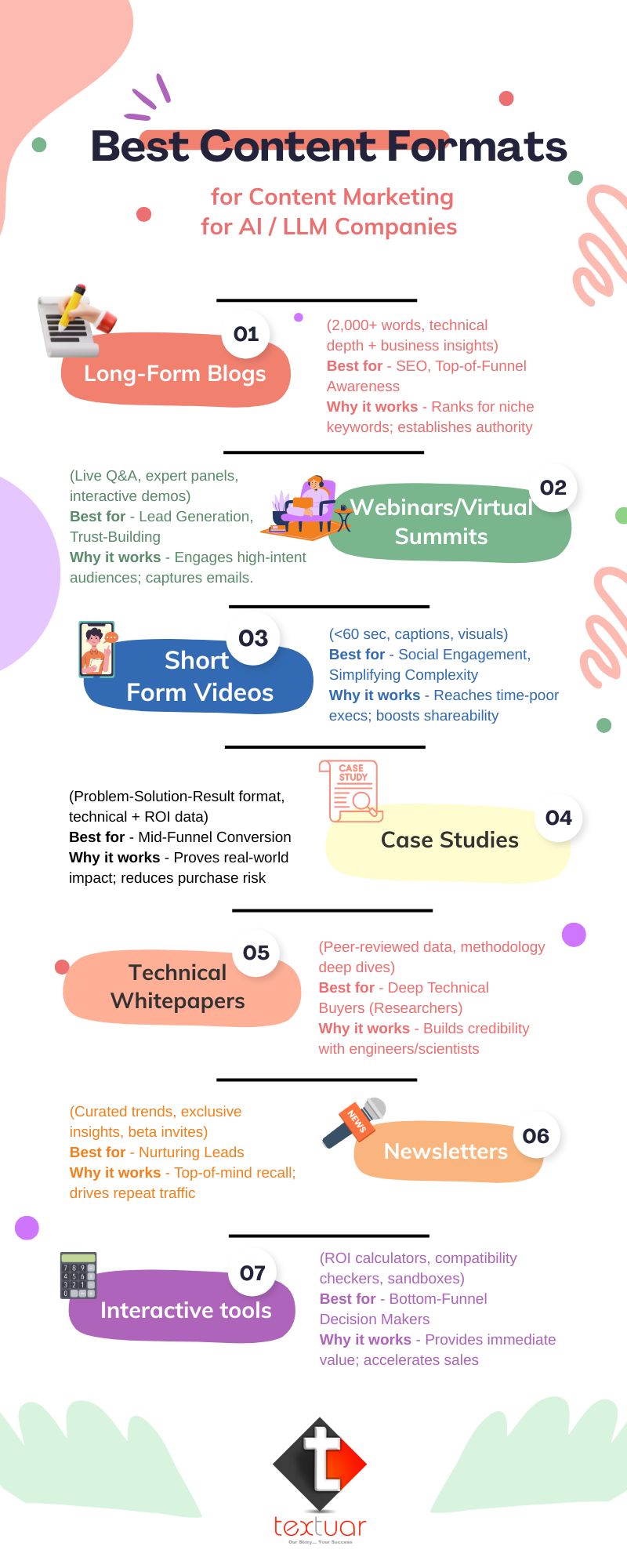
1. Long-Form Blog Posts- The SEO Workhorse
To start with, you can invest in comprehensive, long-term blogs with keyword terms such as ‘LLM fine-tuning workflows’ or ‘AI model bias reduction.’ They work to boost awareness about your brand’s existence and is connect with the Top of Funnel (just starting the buyer journey).
Eventually, these articles bring regular visits from people who find them through online searches.
This, for example, a ‘Building Custom AI Training Pipelines’ guide, can be useful for CTOs working on scaling their AI projects. When your focus is to share well-researched information over short notes, your company gains recognition as an expert with the help of strategic content marketing for LLM training.
2. AI-Targeted Webinars and Virtual Summits
You should also organise webinars on focused topics such as ‘Making LLM Work Efficiently’ or ‘Responsible AI Training’. You can show your knowledge and gather interested leads by using registration forms during such events.
Moreover, virtual summits with industry experts (e.g., ‘Future of Generative AI’) increase credibility and build partnerships.
One good idea here is to turn webinar content into tutorials on YouTube or LinkedIn, thus helping with your content repurposing needs.
3. Short-Form Video- A Vital Asset for Content Marketing for AI Companies
Not everyone reads long-form content. We recommend you to leverage channels like YouTube shorts or Instagram reels for 60-second explainers.
For example, a video entitled ‘LLM vs. Traditional NLP- Key Differences’ breaks down technical language for time-strapped executives. Couple these with captions and graphics to boost accessibility.
Remember, short-form videos fuel engagement but must have sharp scripting to give value.
4. Trend Curation Newsletters
For now, fuel leads can get the latest news and updates through ‘AI Breakthroughs Weekly’ and ‘LLM Research Digest.’ Post summaries of recent papers, company announcements and case studies. Thanks to this structure, your brand is always present, and you are recognised as an expert in content marketing for AI training.
Bonus– Include exclusive invitations to beta tools or early-access webinars to increase open rates.
5. Slide Decks and Infographics for Visual Storytelling
Lastly, design slide decks or infographics to deconstruct difficult subjects such as ‘Stages of LLM Training’ or ‘AI Model Lifecycles.’ You can upload these to SlideShare or LinkedIn. You may even show them in sales pitches to reach people who learn through images.
A good way to help is by creating an infographic that outlines the differences between open-source and proprietary LLMs. Offering these resources helps you attract sign-ups for your email list.
Why Does This Mix Work for Content Marketing Campaigns for AI Companies?
There is something for everyone as executives check infographics, engineers use blogs, and busy teams watch videos.
Changing the format of your content (webinar to blog series) helps you get the most out of your investment. This is something can be efficiently achieved with the help of an LLM content writing company.
By integrating SEO-based blogs, interactive videos, and strategic newsletters, your content marketing for LLM training efforts becomes a 360-degree lead-generation machine.
Important Lesson– Adapt your approach to reach your audience in different ways. Pay attention to quality and connect each format to the various stages of the buyer journey. Lastly, track your results to optimise your approach to content marketing for AI companies.
How to Do SEO for LLM and AI Training Company?
Being found on Google brings in organic traffic. This leads to increased conversion rates and business success. Here are the steps that you need to keep in mind.
1. Understanding Search Intent in Technical Spaces
The success of SEO and content marketing for Training AI depends on user intent understanding. Technical groups will typically search for short-term answers, like code snippets or benchmark data. Business executives may search for top-level data, like ROI of LLM adoption.
For example, a search such as ‘LLM fine-tuning’ suggests a developer’s call for prompt action, whereas ‘AI compliance risks’ resonate with executives. By aligning content with these goals, bounce rates are reduced and the proper visitors are drawn in.
2. Tools to Find High-Value Keywords
You should start by using Ahrefs, SEMrush or AnswerThePublic for keyword research. They provide information on search numbers, how many competitors you have and semantic keywords that are closely connected with your main keyword.
For instance, ‘GPT training course’ has a big search volume and only moderate competition, so it’s an excellent choice. You can use the Google Keyword Planner to find out what keywords are missing from your list.
It is advisable to opt for long phrases such as ‘multi-modal AI training frameworks’ when writing for LLM Training. They work much better for your content marketing for AI companies. Such long phrases have a better chance of coming up on Google AI Overviews too.
3. Balancing Niche and Broad Keyword Targeting
Try to keep your report both correct and accessible to a broader audience. Match niche topics with business topics. For instance, align the subjects of ‘reducing the costs of training AI models’ and ‘LoRA for LLM efficiency’.
Thanks to this two-way approach, you show up for important queries and interest decision-makers who make company growth plans. CRO executives often say ‘scalable AI solutions,’ even if engineers are interested in ‘distributed training using PyTorch’. To close this gap, make your videos suitable for both audiences.
4. Examples- Targeting the Right Phrases
Pick keywords that reflect what people really want. For example:
Technical and Business keywords –
-LLMs quantitation methods,
-Transformer model optimization,
-AI training expense calculator, and
-Secure LLM for enterprises.
They are relevant to various types of readers and generate high-quality visitors. To attract local consumers, consider using localised keywords such as ‘AI training agencies in London’. Always check keyword relevance against competitor research or user feedback.
5. Creating Content Clusters for Authority
Group content into clusters based on main themes as a part of content marketing for AI companies. An AI content writing company might suggest pillar page on ‘LLM Deployment Strategies.’ This asset can then reference sub-topics such as ‘model monitoring tools’ or ‘GPU cost management’. Doing this helps your website rank higher in search engine results.
Link internally from your articles so that readers stay on your site and your pages get more authority. Gradually, clusters help your domain gain authority in content marketing for AI training.
6. Applying Schema Markup for Increased Visibility
Finally, use schema markup to make your site’s search result more noticeable. For example, make sure to add an FAQ on commonly asked questions. An example FAQ can be about how to lower the inference time for LLMs.
Make sure you don’t miss out on guides like ‘Fine-tuning GPT-4 in 5 Steps.’ Rich snippets are created by Google because of the markup. Thus, it increases the likelihood that individuals will click on your advertisements. With Google’s Structured Data Markup Helper, markup coding is simple.
Using schema markup together with keyword optimisation can significantly enhance how your content marketing for LLM training online visibility.
To succeed with AI and LLM keywords in SEO, you should always be open to change as times change. Make sure your content is in line with AI Overviews by having multi-modal content (images, infographics) with FAQs and tables. This way, you will show up at the top and get the best leads possible.
What Tips Help Strengthen Content Marketing for AI Companies?
Your content should also be able to convert visitors. Guide people toward the next stage of the process with the help of these strategies and tips.
| Content Marketing Optimization Tips for AI Companies | ||||
| Strategy | Implementation | Best For | Examples | Why It Works |
| Irresistible CTAs | – Action-oriented language | Lead conversion | “Start Your Free LLM Trial” | Reduces friction; guides users to next step |
| – Test variations (e.g., “Get Started” vs “Learn More”) | “Download PyTorch Code Samples” | |||
| – Place in blogs, videos, exit pop-ups | ||||
| Persona-Targeted Landing Pages | – Separate pages for different roles (CTOs vs Engineers) | Improving conversion rates | “LLM Solutions for CTOs” | Speaks directly to each buyer’s priorities |
| – Highlight role-specific benefits | “Developer Hub” | |||
| – Include trust markers near CTAs | ||||
| Strategic Content Gating | – Gate high-value assets (whitepapers, tools) | Lead qualification | “Enterprise AI Security Whitepaper” (gated) | Balances lead capture with brand goodwill |
| – Keep educational content open | “Open Access: AI Glossary” | |||
| – Use progressive profiling | ||||
| Dynamic Personalization | – AI-driven content adaptation | Enhancing relevance | Engineers see: “API Documentation” | Increases engagement by 40%+ (HubSpot data) |
| – Job-title specific CTAs | CEOs see: “ROI Calculator” | |||
| – Behavioral triggers | ||||
| Social Proof Integration | – Client testimonials | Building trust | “Recommended by Google DeepMind” | Reduces buyer hesitation for high-ticket services |
| – Compliance badges | “Reduced training costs by 30%” | |||
| – Partner logos | ||||
| – Case study snippets | ||||
| Multi-Channel Amplification | – Repurpose content across platforms | Maximizing content ROI | Blog → LinkedIn article → Twitter thread → YouTube summary | 5-8x increase in content reach (MarketingProfs) |
| – Tailor format to channel (e.g., LinkedIn vs Reddit) | ||||
1. Making Irresistible CTAs
– You should create phrases that prompt users to act such as ‘Start Your Free LLM Trial’.
– Add CTAs to the end of your blogs, to exit intent pop-ups or to the descriptions of your videos.
– Try out different options (i.e., ‘Get Started’ vs ‘Learn More’) to determine which one performs best.
2. Making Landing Pages That Target Specific Audience
– Create separate pages for each type of user. For example, LLM Developers or CTOs Scaling AI Teams.
– Focus on what each audience is looking for: developers want to see the technical details, while executives want to know about the ROI.
– Place trust markers (e.g., ‘Recommended by Google DeepMind’) close to CTAs in order to minimise reluctance.
3. Strategically Gating Content
– Give away helpful resources (like a checklist) to attract new potential customers.
– Place features like- access to APIs only for the customers you want to work with most.
– For example, gate a whitepaper ‘Enterprise AI Security Best Practices’ behind a brief form.
– Don’t over-gate – straightforward blogs or explainers should remain open to create goodwill.
4. Personalising CTAs for Buyer Personas
– Personalise CTAs depending on user behaviour or job functions.
– Engineers may get ‘Download PyTorch Code Samples’. Whereas CEOs receive ‘Calculate Your AI ROI’.
– You can use tools such as HubSpot or Unbounce to dynamically change your CTAs.
– This helps the content become more relevant which is key for successful content marketing for AI training.
5. Leverage Social Proof and Trust Indicators
– Emphasize testimonials of the client, e.g., ‘Reduced training costs by 30% with our AI solution’.
– Highlight security compliance badges (e.g., ISO 27001) or partnership badges (e.g., NVIDIA Inception).
– Incorporate case studies around CTAs – e.g., ‘How [Client] accelerated LLM Deployment in 6 Weeks.’
– These elements enhance credibility, an important driver for LLM Training conversions for content marketing.
People sign up only after they trust and find the website valuable. Make your CTAs fit the requirements of each user, use gate-specific content to keep things restricted and use proof of what others are saying to overcome doubt. You can successfully turn visitors into high-quality leads by picking tactics that fit their main interests.
What are the Key Content Distribution and Promotion Channels for GPT and AI Companies?
Creating valuable content is only step one. You also need to promote it with tactical distribution on channels where your target audience is likely to be found. Here are some hubs of success when you consider promoting content for your GPT or AI company.
1. LinkedIn is Key to Success in Content Marketing for AI Companies
First off, try LinkedIn, the premier hub for B2B outreach. Place your articles and case studies where CTOs and CEOs may view them. Discussions with executives may be initiated through a post that outlines the main LLM market trends in 2026. Become active in groups with a focus on artificial intelligence.
Use LinkedIn Articles to give detailed information, and make sure to mention the top industry figures in your article to increase the sharing of your story. AI training content marketing on this platform is best aimed at key decision-makers.
2. Reddit and Hacker News- Engage with Technical Communities
At the same time, forums like Machine Learning and Hacker News focus on discussions for experts in machine learning and related fields.
You may publish articles exploring specific issues (an example- ‘Optimising LLM Latency in Production’) that will appeal to these groups. Don’t promote the business too directly with content writing for AI tools. Rather, you should go for valuable content by helping people by suggesting ways to solve their problems. The conversions will follow automatically.
3. Paid Advertising- Targeted Advertising for Quick Results
If your AI/LLM training company needs a rapid burst of visibility and engagement, then try out Google Ads or LinkedIn Ads. Such paid ads deliver hyper targeted, instant visibility to appear in front of high-intent audiences.
For example, you can target CTOs at healthcare organizations with ads for your HIPAA-compliant LLM training workshops. Another option is to leverage Google Search Ads by bidding on keywords like ‘reduce LLM hallucinations.’ This will help capture urgent buyer searches.
Another good move is retargeting. It helps to reengage visitors who viewed pricing pages but did not convert. Paid campaigns are used to augment organic efforts, bringing your content marketing for AI training to time-constrained buyers actively hunting for solutions.
4. Newsletter Collaborations- Leverage Trusted Audiences
Let industry newsletters like Import AI or The Batch run articles you have written that are relevant to their readers. Creating an article about ‘Emerging LLM Use Cases’ gives your brand access to a large group of subscribers.
We recommend finding companies to sponsor your shout-outs or ads so you can help them reach your audience. It allows brands to reach their audience more quickly, which is vital in crowded markets for content marketing for AI companies.
5. Guest Posting- Leverage Authority Sites
Lastly, write articles on websites such as Towards Data Science or InfoQ. A tutorial like ’Evaluating AI Training Platforms’ on these platforms generates referral traffic and establishes backlinks.
You should target websites your audience already trusts in order to maximise credibility. Diversifying channels makes your content visible throughout the entire buyer’s journey.
How to Measure ROI of Content Marketing for AI companies
It is not enough to do content writing for machine learning companies and distribute it. You should also measure ROI of content performance from time to time. Here is how you can do it.
To begin with, you need solid data to prove your content investment works. In fact, content marketing for AI training success depends on tracking the right data. Because your customers often take months or even years to buy, measuring ROI becomes crucial for proving that your marketing budget is delivering outcome as expected. Here are some ways to do so.
| AI Content Marketing ROI Measurement Framework | ||||
| Metric Category | Key Metrics | Measurement Tools | AI-Specific Benchmarks | Why It Matters for AI Companies |
| Lead Generation | – Marketing Qualified Leads (MQLs) | HubSpot, Salesforce, Google Analytics | 5-15% conversion from MQL to SQL (typical for AI services) | High-ticket AI solutions require strong lead nurturing |
| – Sales Qualified Leads (SQLs) | ||||
| – Demo requests | ||||
| Engagement | – Avg. time on page | Hotjar, Google Analytics, YouTube Studio | 3+ mins time-on-page for technical content | Shows content resonates with technical audiences |
| – Bounce rate | ||||
| – Video completion rate | ||||
| Conversion | – Content-attributed deals | CRM systems, attribution platforms | $5k-$50k CAC for enterprise AI solutions | Proves content drives high-value deals |
| – Pipeline velocity | ||||
| – Customer acquisition cost (CAC) | ||||
| Authority Building | – Backlinks from .edu/.gov sites | Ahrefs, SEMrush, Mention | 50+ quality backlinks for authority content | Establishes technical credibility |
| – Citations in research papers | ||||
| – Media mentions | ||||
| Revenue Impact | – Content-influenced revenue | Closed-loop analytics | 20-40% of revenue influenced by content (B2B tech norm) | Justifies content budget for complex sales cycles |
| – Deal size from content leads | ||||
| – Retention rates | ||||
Let us explore these factors in detail
1. Track the Right Lead Metrics
First, you should start by tracking Marketing Qualified Leads (MQLs) and Sales Qualified Leads (SQLs). These numbers show how well your content moves prospects forward. For example, track how many people download your guides or sign up for demos. Then, see how many of them become paying customers.
Next, keep an eye on engagement metrics like page views, average reading time, and bounce rate. Generally, high time-on-page means your technical content connects with developers. On the other hand, low bounce rates show that visitors find real value and stick around instead of clicking away.
Moreover, check your click-through rates from your email newsletters and content campaigns as well. Strong CTR numbers prove your subject lines grab attention. Also, track demo sign-ups that come directly from specific blog posts. This way, you see which content pieces drive real business results.
2. Choose the Right Attribution Model for Long Sales Cycles
Your AI training business likely has long, complex sales cycles with multiple touchpoints. The full-path attribution model is ideal for those complex B2B paths because it gives proper credit to every touchpoint with a customer for the entire buying process. Therefore, now you have the complete picture of what drives customers’ decisions.
Linear attribution is also ideal for complex sales journeys. It splits credit equally across all touchpoints, giving you balanced content performance reporting.
3. Leverage Analytics Tools to Connect Content to Revenue
To make this easier, use tools like HubSpot for detailed attribution reporting. Google Analytics 4 has detailed website behaviour insights. Similarly, Mixpanel has detailed tracking of user behaviour and actions. These tools connect your content to actual revenue outcomes. So, you can see which posts generate the most qualified leads.
Why Choose Textuar for Content Marketing for AI Companies?
The right content partner can make a real difference in your results. That is why Textuar brings a unique blend of technical know-how and proven processes. Here’s why your AI or LLM company should consider us-
| Why Textuar Stands Out for AI Content Marketing | |||
| Differentiator | What Textuar Offers | AI Industry Impact | Examples/Case Studies |
| Technical Expertise | Writers with ML/LLM architecture knowledge | Ensures accuracy in complex topics (RAG, fine-tuning) | “Reduced training costs by 30%” client testimonial |
| Human-Crafted Content | <5% AI-generated, plagiarism-screened | Maintains E-E-A-T (Google’s quality standard) | Peer-reviewed content for 0% AI detection |
| Scalable Production | 25K-28K words/day with research depth | Meets enterprise AI content demands | |
| SEO for Technical Terms | Keyword clustering + schema markup | Dominates niche queries (e.g., “LLM fine-tuning workflows”) | E.g.: 39.8% CTR for top-ranked pages |
| Multi-Format Repurposing | Blogs → Webinars → LinkedIn carousels | Maximizes content ROI across channels | “AI Breakthroughs Weekly” newsletter |
| Google AI Overviews Optimization | E-E-A-T-focused content | Ensures visibility in AI-generated search summaries | Featured in Google’s LLM responses |
1. Deep Technical Expertise in Content Marketing for AI Companies
Textuar hires writers who are familiar with machine learning, neural networks and LLM architectures. As a result, your content needs technical accuracy that builds real trust with developers and data scientists in your industry.
We produce content that demonstrates industry knowledge in a simple way that business leaders can understand.
2. Proven Track Record with B2B and AI Technology Companies
With more than 20 industry sectors, our work includes the leading technology areas where accuracy and deep research is essential to well-articulated content. Because of this, our proven skills in creating complex technical content help us advise the right ways to promote your products.
We also ensure that your AI training platforms are well-presented to technical members and senior leaders, allowing your message to make sense at all points in the decision process.
3. Human-Crafted Content Without AI Dependencies
We do not allow AI-generated content. You will receive genuine, engaging content that highlights your brand’s expertise with unique insights. Your brand’s content must come from real people with fresh ideas instead of being created by machines.
All our writers craft fresh content that is screened for plagiarism and less than 5% AI-generated in all their checks.
4. Scalable Content Production for Growing Companies
Our team provides 25,000-28,000 words of unique, research-based content every single day to meet your increasing needs. Therefore, you can grow your content operations greatly without sacrificing standards or missing any deadlines.
Also, we make sure that our approach fits properly into your project management systems and day-to-day processes.
5. SEO Optimization for Technical Search Terms
We blend keywords into engaging stories that help your company rank higher in search engine results and train your audience. Our SEO knowledge enables you to compete well for specialized search terms that bring relevant traffic to your website.
6. Elaborate Quality Assurance Process
All of our final pieces are reviewed and edited carefully before they are delivered. What you get is writing that constantly lives up to the best standards and displays your brand’s technical knowledge.
Above all, we take care of quality control closely to support accurate delivery and keep your marketing materials aligned with each other.
7. Incorporating Emerging Trends Reshaping AI Content Marketing
The content for AI firms’ keeps changing rapidly with new technologies continually arriving and revolutionizing how industries think. Hence, you need to remain ahead of trends that will essentially dictate how customers use and engage with technical content in the next few years.
For instance, generative demo content is a significant change in product demonstration. This is a crucial part of content marketing for AI companies. It allows potential customers to explore your AI models using interactive demos that are tailored to their exact interests and technical expertise.
Moreover, interactive tutorials and hands-on labs increasingly substitute for static documentation for technical users who prefer learning through practical use cases. Developers always prefer learning from hands-on exercises and code-along sessions over conceptual explanations.
8. Adapting Content Marketing to Algorithm Changes
Search algorithms and AI Overviews increasingly prefer content that demonstrates evident expertise and established authority in technical areas such as training AI models. Therefore, you need to constantly produce content meant for search engines as well as AI Overviews.
GPT tools like ChatGPT and Claude should consider your content truly authoritative in the space of AI. When this happens, your site gets a well-deserved mention on AI responses.
In addition to that, emerging formats such as voice and image search are increasing rapidly. You must be prepared for this. Textuar enables you to adapt to trends while remaining easy to locate. We ensure your content is compatible across all channels and reaches the right people every time.
In conclusion
AI content marketing succeeds if you have a wise strategy. This strategy should find a balance between technical topic matter in detail and definitive business objectives. To succeed, your content has to gain the respect of decision-makers and the tech teams. You must also establish the value of your content through tools measuring outcomes.
Select content partners with knowledge of content marketing for AI companies.
For instance, Textuar provides an experienced team of AI SEO content writers with expertise in AI and LLM training nuances. We produce high quality content assets that aligns with your business goals and target audience. And we keep your message natural and technically correct so that they appear on AI Overviews and organic searches.
Let us assist you in creating a content marketing system that produces long-term business outcomes. Connect with Textuar today to start evolving your content strategy.
Content Marketing for AI Companies – FAQs
1. Why is content marketing unique for AI training and LLM businesses?
Content marketing for AI training demands a technical, educative, and trust-generating strategy. And the reason is simple: your target audience comprises developers, data scientists, and AI technology leaders.
These individuals seek precise, comprehensive content prior to purchase. You, therefore, have to blend lucid business benefit with technical information. When you do it effectively, you establish trust among tech users as well as decision-makers.
2. How frequently should we create content for our AI training platform?
Prioritize quality over speed. 1–2 good piece of content per week is a reasonable target. This could be a blog entry, guide, or informative webinar. Have a content calendar featuring evergreen topics and fresh trends. Include also product updates addressing different user groups’ needs. That way, all your visitors remain engaged.
3. Do we develop different content for developers and business buyers?
Yes, every group desire various content. Developers prefer step-by-step instructions, tutorials, and hands-on examples. Business buyers, such as CTOs, are concerned with ROI and scalability. They need to know how your product addresses real issues. By addressing each group directly, you enable both groups to comprehend the worth you provide.
4. How do we measure the success of our content marketing for AI companies?
Begin by monitoring visits, email subscriptions, and demo requests. Next, examine how long visitors linger on individual pages. Note backlinks from credible tech and educational websites. These indicate your content is worthy. Utilize tools such as Google Analytics, HubSpot, or Mixpanel to tie content to actual sales outcomes.
5. Are we able to use automated systems to create our content?
Yes, but watch out. AI tools are okay for first drafts, outlines, or helping with research. But always get it reviewed by a human expert before publishing. Your AI clients are looking for quality, accurate information. Overuse of AI can damage your brand if the information is incorrect or misleading.


